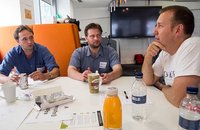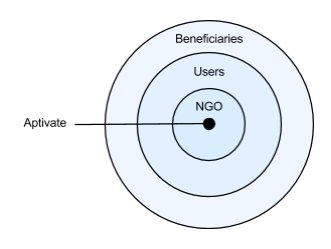Discussing participation in IT projects at Apticon

This was a hot topic at Apticon this year. People had questions like how do we get people involved in the end product? how can end users be part of creating the product? and how do we add participation into an Agile process? We had a compelling discussion, here's a few things we touched on.
We started the session by having a go round about why this subject is interesting for us. Alan Jackson (Aptivate) stated his interest in working out how we can integrate participation into our process and how it would work with something like the Reflect methodology. He was talking about how we communicate our process with clients and said ‘They are already accepting all this crazy stuff we tell them to do, if we just add some more participatory stuff I think they will accept it’.
Michael Jenkins (Metalab) talked about how he believes gamification is important and that we need to think about ‘creating an engaging experience on the mobile’. Tim Kent (Knowledgepoint) expressed how in his experience it's ‘very important and often done wrong’ and Julia Chandler (DFID) questioned how we can make sure people understand what they are being asked for?

Alan described how he sees there being different levels of participation. He described how you could see it as talking to the users of the software, which can often be the NGO’s field workers but that you can go further than this by talking the beneficiaries and seeing how it's has affected them. This made me think about how many levels removed we often are from the purpose (image left).
Kavita Rajah (Aptivate) said that we need to mention participation earlier in the conversation. When we are educating the client about Agile, how we work and about their responsibilities are as a PO (Product Owner).
There was discussion around peoples misconceptions about ‘consultations’. Alan described how people see it as a ‘Gold standard’ and don’t realise that there are levels above. Chris Wilson (Aptivate) said that people treat it as if it's a really expensive thing that we can only offer to a few people rather than finding ways to talk to lots of users.
Matt Haikin (Aptivate) told a story about how an IT projects intervention had damaged a face to face process that was happening before it, to make the point that there is a risk when bringing in an entirely new process and it can damage what people are already doing. ‘Technology is not always the solution’
George Flatters (Aptivate) discussed that we should be trying to get clients to let us be involved earlier in the process and suggested that when we receive an RFP we could send back a questionnaire to help inform what we recommend.
Tom Lord (Aptivate) pointed out how we ‘Can’t participate with users in two months and make everything all right’ expressing that unless the client has a long standing participatory culture it's going to be difficult for us to make a difference. ‘We’re not going to have a big influence with a few skype calls and a trip to Zambia’
Tim said that problems come when the product does not have buy in from the users and from the managers and that ‘These problems make the project fail’. He suggested that maybe Aptivate should have two levels ‘Normal project' and ‘Participatory’ with extra project management ‘I think that people should be willing the pay for the additional expertise’
Julia was asked about what her experience was, that she had mentioned earlier, where people didn't understand what they were being asked for. She described a project where the design was lead by what the users said they wanted, but that it was not a success. She said that they should have ‘Sat people down and worked out what people really wanted to achieve rather than just going with what they thought they wanted’
Paper Prototyping was brought up by Tim Davies suggesting that we should be using things like this to ‘co-design’ software.
The session came to an end but it felt like people still had plenty to share. I'm sure that the discussion will continue and that it will help inform how we involve end users in our projects. Find out more about Apticon events on our Meetup group.
